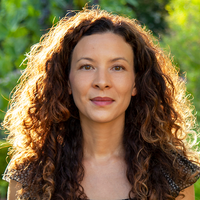On remembering the first thing that made you proud
Prelude
Mark Pagán is an award-winning filmmaker, podcast producer, performer, and educator. His work and performances have been shown at festivals and shows worldwide including Slamdance Film Festival, Maryland Film Festival, Arizona International Film Festival, Family Ghosts, PRX, Latino USA, CBC, WNYC’s Nancy, Colorado Public Radio’s On Something, RISK!, The Moth, and Story Collider. Mark is the host and creator of the award-winning podcast, Other Men Need Help, a playful docu-essay show dissecting masculine insecurities, which is a fancy way of saying it’s like Sesame Street about men.
Conversation
On remembering the first thing that made you proud
Podcast producer and filmmaker Mark Pagán discusses paying attention to his boyhood interests, using discomfort as an editor, and how the lies he was told his entire life inform his new project.
As told to Zak Rosen, 1531 words.
Tags: Podcasts, Film, Writing, Inspiration, Process, Success, Beginnings.
What’s the first thing you made that you remember being proud of?
I haven’t thought about this in years. I made a magazine in fifth grade. We had a school project. I wasn’t a very good student, and I particularly had a hard time in things like science and math. Maybe it was for English class, I can’t remember, but I decided to make a magazine and it was an entertainment magazine. I think I might’ve interviewed people. Of course, I didn’t have access to anybody in Hollywood or anything like that.
It was so meaningful for me to complete it. Number one, to complete a project, and also to have a design. I remember showing it to my mom and my dad, and they were like, “Oh, this is really cool,” and they weren’t humoring me. For a fifth grader, I did it all on my own, didn’t have any help. I knew who I was talking to. I just remember that feeling.
There’s a beach read that I did a few years ago, where my ex and I were at a beach house and there was just a few books, and one of them was Gretchen Rubin, The Happiness Project. She said something along the lines of like, whatever you were good at or whatever you did when you were 11, 12, 13, is, I’m really paraphrasing this right now, is something you’ll be good at as an adult, or something you enjoy, or something you should look at engaging with as an adult. I think about that magazine. That was the first thing that I remember creatively making and having a voice, and being very engaged with doing. I have it somewhere. It’s still something I’ve kept all these years.
That resonates in that you feel like right now you’re doing stuff that, that fifth grade self was poking around in?
I think so. I like short form content. I like essayistic work. I like, in some ways, being an editor-in-chief of something and giving a voice to something I feel, if not expertise in, then an obsessive nature about.
You were reading this Gretchen Rubin book and then you created Other Men Need Help [Mark’s narrative podcast “about the emblems, habits, and struts in the male performance”]. What was happening in your life at that time when you conceived of this project? Why was this project essential to make for you?
A month, two months, after I did that beach trip where I read the Gretchen Rubin book, I had gotten accepted into an artist residency in Northwest Minnesota. I was actually planning on making a feature out of Raymond & Lena [a short film Mark made in 2011]. That was the idea for a long time. So I went up there with tons of literal, physical material. For a month, I sat there, started trying things out, and I kept writing. I had this journal that I physically made. I took a book binding class, and I was just going to use it kind of as a diary. I kept coming to the journal. I just kept writing. I don’t know why, but I kept writing these stories, and I kept having this longing. I was continuing to come back to this story of, after I lost my virginity, I went to a beautician and got a wax for the first time. It’s a long story, but it was basically insecurity, body hair at an early age, a girl who I lost my virginity to, that I was feeling very insecure physically around. So I was like, I will create a bit of an Adonis out of my body. I said, “Why am I focusing on this story? Why do I keep sharing these embarrassing stories?” It was like a lot of things were happening.
The other thing too is, I was in my 30s, I had been raised on men’s media. My father died when I was a teenager, and my mother had a boy, her son, me, going through puberty, and she’s like, “I don’t know what to do with you.” So she gave me his electric razor and a subscription to Esquire. It’s like, “Here’s some stuff that I think will help you.” So I’ve been consuming men’s media for years, and have a love/hate relationship with it. I think at that time I was writing these things, I was like, “You guys have lied to me.” I’m an adult male now, and I feel lied to and directionless. I feel like nobody is fucking telling the truth about the male experience. Nobody’s telling the truth.
What was the lie, you think, that men’s media was telling you?
I think a lot of men’s media is super prescriptive. Still, I follow a lot of men’s lifestyle material because it’s beautiful. It’s beautifully aesthetic. It gives me a sense of my own narrative. It gives me a sense of a narrative that I want. It gives me a sense of mythology, because we have the watches, the leather, the aesthetic of all of it. I think it puts a veil on needs. It’s our fathers and our grandfathers mythology of, here’s, again, these emblems of a nice watch band, sort of veiny arms and a good handshake and a glass of Negroni, an ax, all these. It’s a prescriptive ideology of, you take these, you’re okay. Sure, it doesn’t have to be related to just one gender. I think we’re all given the, “Here’s the uniform you wear and you should be in good shape.” But the other thing, too, that I think is extremely painful, extremely painful, in men’s media, I think it’s extremely damaging, it’s extremely damaging culturally. It doesn’t just show up, it shows up in the ways men raise men, is the lack of accountability. That, I get so emotional about. It is absolutely, fundamentally damaging.
I understand, especially with work like Esquire, and I’m not disparaging, I have a subscription to Esquire still. I still read these magazines. I think there’s work that’s done, in terms of personal essay content, and I don’t want to target Esquire. But just in the general landscape, men’s help, all this stuff, the lack of accountability, where it’s an available option to do that.
If we are offering some letter of reflection, accountability, that’s generationally damaging. I think that the three sides of our development come from, three or four was, our family, our teachers, religion, for folks that are in religion, and media. I think all of them have a responsibility, but especially purveyors of a narrative of masculinity or maleness or gender is, there is a responsibility to be reflective and accountable.
I had an idea of Sesame Street about men, for adults. I was like, “I don’t know what this is going to be, but I’m going to start with this body hair essay.” And I was like, “I just want somebody to tell the fucking truth to people.” I’m not trying to put myself on a platform and be like, “I’ll be the one,” but the real thing is that I was feeling so isolated. Not even my friends were talking about it, and talking about their insecurities. It was like, “I’m an adult, and I feel so deeply insecure still, the same way I did when I was 18. I need somebody to talk to about this. I can’t be the only one.”
If I’m sitting here cringing and also laughing at this, I was like, “I think that’s the kernel.” A show that’s just secret sharing from men. It is trying to break self-mythology, and just say, “Here’s what I was scared of. Here’s what I tried to do, here’s what I wanted. Not being prescriptive. Those are a lot of the ingredients that went into it.
I love that you’re paying attention to both, what was making you cringe and what was making you laugh. Those are real creative north stars that you’ve just articulated.
You’re right, I tell people that, too. It’s like, if you find that in your gut, then that’s all you need to know. You’re your own barometer. It takes that time to realize, “No, if it’s feeling like this, if my body is turning into an insular rock, going, ‘I don’t want to share this,’ that’s where the magic lives, and that’s where it’s going to feel most connected.” Luckily, that muscle has developed, so now that working on Other Men or other things, I can go, “I’m not getting that feeling,” and that means it’s not working. I think that’s been the most helpful development.
Mark Pagán Recommends:
5 Favorite desk snacks when writing
-
A pile of wholewheat Goldfish crackers on a napkin.
-
2-3 tangerines or clementines (can’t remember which is which but interchangeable for me).
-
Crunchy peanut butter or almond butter.
-
Sometimes it’s just nice tuna with some pesto or mayo.
-
Leftover pizza.
- Name
- Mark Pagán
- Vocation
- Filmmaker, podcast producer, performer, and educator
Some Things
Pagination



